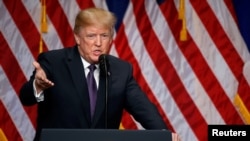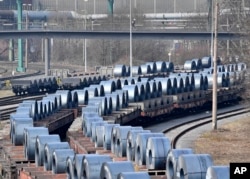The White House says that President Donald Trump, in a phone call with Canadian Prime Minister Justin Trudeau, has emphasized his commitment to a free trade agreement among the U.S., Canada and Mexico that is "fair to all three countries."
The two leaders talked Monday in the midst of ongoing negotiations in Mexico City over revamping the 1994 North American Free Trade Agreement and days after Trump said he plans to impose a 25 percent tariff on steel imports and 10 percent on aluminum, both of which would hit Canada, a big exporter of the metals to the United States.
The White House said Trump noted that the "current agreement leaves the United States with a trade deficit." In 2016, the last year with complete government statistics, the United States reported it sent $12.5 billion more in goods and services to Canada than it imported, while it had a $55.6 billion trade deficit with Mexico.
Trump said Monday he is not backing down on his decision to impose the steep tariffs on steel and aluminum imports, despite growing pressure from political and diplomatic allies and U.S. companies to avert a policy that could spark a trade war.
Trump said on Twitter that Mexico and Canada could be exempted from the planned tariffs if a new and "fair" NAFTA is reached. He contended that the current agreement "has been a bad deal" for the U.S. with "massive relocation of companies & jobs." He said Canada "must treat our farmers much better" and that Mexico "must do much more on stopping drugs from pouring into the U.S."
At one point, Trump said, "For many years, NAFTA has been a disaster. We are renegotiating NAFTA as I said I would, and if we don't make a deal I will terminate NAFTA. But if I do make a deal which is fair to the workers and to the American people, that would be, I would imagine, one of the points that we'll negotiate. It will be tariffs on steel for Canada and for Mexico."
Beginnings of trade war?
Economist Gary Hufbauer of the Washington-based Peterson Institute for International Economics told VOA that people in Canada and Mexico see the Trump approach as bullying, and that their officials are less likely to make concessions that look like giving in to a bully. He also said those asking Trump to back off the tariff plan are right to fear a trade war.
"Whether we get to a trade war will depend very much on the reacting of other countries," Hufbauer said. "The tariffs alone aren't a trade war, but if other countries react by putting fairly strong restrictions on U.S. exports you can say we're edging into a trade battle and it may escalate to a trade war."
Trump's decision to impose steep tariffs on steel and aluminum imports has drawn strong condemnation from some in his own Republican party and from U.S. trading partners around the world. Analysts warned the tariffs will hurt many U.S. allies.
In a rare break with the White House, House Speaker Paul Ryan and other key Republican lawmakers are trying to convince Trump to change his mind and not impose the tariffs. Ryan and the others say the tariffs would hurt consumers because they could lead businesses to impose higher prices and undercut any positive effect the recent Republican-approved tax cuts would have on the U.S. economy.
Ryan said Tuesday any new tariffs should be "more surgical and more targeted," rather than imposed throughout the world, to punish countries that subsidize their steel and aluminum companies in an effort to undercut prices on the world market.
The motorcycle maker Harley-Davidson Inc. is headquartered in Ryan's home state and is being targeted by Europe for possible retaliation for Trump's plan to impose the steel and aluminum tariffs.
Ryan spokeswoman AshLee Strong said in a statement, "We are extremely worried about the consequences of a trade war and are urging the White House to not advance with this plan. The new tax reform law has boosted the economy and we certainly don't want to jeopardize those gains."
Keeping campaign promise
White House Press Secretary Sarah Huckabee Sanders said the administration has a "great relationship" with Ryan, but "that doesn't mean we have to agree on everything." Sanders added, "The president has been committed and talked about this for many years, particularly on the campaign trail, and the people came out loud and clear and supported this president, therefore supporting the policies he campaigned on."
Sanders said the administration is still finalizing the details of the measure, and she did not want to provide more information on the decision ahead of the final announcement.
Trump tweeted last Friday that "trade wars are good, and easy to win." When asked to elaborate, Sanders said, "The president feels if we ended up in a trade war, the president is confident we will win, but that's not the goal, the goal is to get free, fair and reciprocal trade, and hope other countries will join him."
Trump told reporters he does not believe his plan to impose the aluminum and steel tariffs will spark a trade war.
VOA's Victor Beattie contributed to this report.






